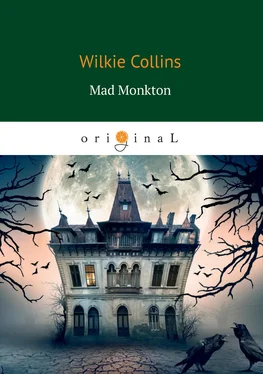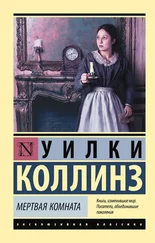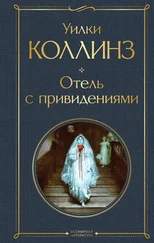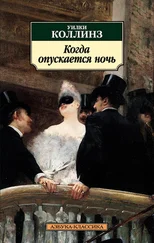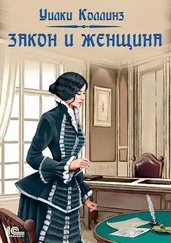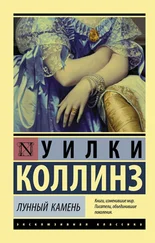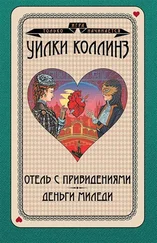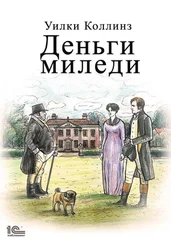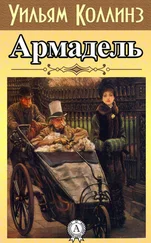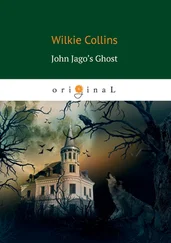Wilkie Collins
Mad Monkton
The Monktons of Wincot Abbey bore a sad character for want of sociability in our county. They never went to other people’s houses, and, excepting my father, and a lady and her daughter living near them, never received anybody under their own roof.
Proud as they all certainly were, it was not pride, but dread, which kept them thus apart from their neighbors. The family had suffered for generations past from the horrible affliction of hereditary insanity, and the members of it shrank from exposing their calamity to others, as they must have exposed it if they had mingled with the busy little world around them. There is a frightful story of a crime committed in past times by two of the Monktons, near relatives, from which the first appearance of the insanity was always supposed to date, but it is needless for me to shock any one by repeating it. It is enough to say that at intervals almost every form of madness appeared in the family, monomania being the most frequent manifestation of the affliction among them. I have these particulars, and one or two yet to be related, from my father.
At the period of my youth but three of the Monktons were left at the Abbey – Mr. and Mrs. Monkton and their only child Alfred, heir to the property. The one other member of this, the elder branch of the family, who was then alive, was Mr. Monkton’s younger brother, Stephen. He was an unmarried man, possessing a fine estate in Scotland; but he lived almost entirely on the Continent, and bore the reputation of being a shameless profligate. The family at Wincot held almost as little communication with him as with their neighbors.
I have already mentioned my father, and a lady and her daughter, as the only privileged people who were admitted into Wincot Abbey.
My father had been an old school and college friend of Mr. Monkton, and accident had brought them so much together in later life that their continued intimacy at Wincot was quite intelligible. I am not so well able to account for the friendly terms on which Mrs. Elmslie (the lady to whom I have alluded) lived with the Monktons. Her late husband had been distantly related to Mrs. Monkton, and my father was her daughter’s guardian. But even these claims to friendship and regard never seemed to me strong enough to explain the intimacy between Mrs. Elmslie and the inhabitants of the Abbey. Intimate, however, they certainly were, and one result of the constant interchange of visits between the two families in due time declared itself: Mr. Monkton’s son and Mrs. Elmslie’s daughter became attached to each other.
I had no opportunities of seeing much of the young lady; I only remember her at that time as a delicate, gentle, lovable girl, the very opposite in appearance, and apparently in character also, to Alfred Monkton. But perhaps that was one reason why they fell in love with each other. The attachment was soon discovered, and was far from being disapproved by the parents on either side. In all essential points except that of wealth, the Elmslies were nearly the equals of the Monktons, and want of money in a bride was of no consequence to the heir of Wincot. Alfred, it was well known, would succeed to thirty thousand a year on his father’s death.
Thus, though the parents on both sides thought the young people not old enough to be married at once, they saw no reason why Ada and Alfred should not be engaged to each other, with the understanding that they should be united when young Monkton came of age, in two years’ time. The person to be consulted in the matter, after the parents, was my father, in his capacity of Ada’s guardian. He knew that the family misery had shown itself many years ago in Mrs. Monkton, who was her husband’s cousin. The illness, as it was significantly called, had been palliated by careful treatment, and was reported to have passed away. But my father was not to be deceived. He knew where the hereditary taint still lurked; he viewed with horror the bare possibility of its reappearing one day in the children of his friend’s only daughter; and he positively refused his consent to the marriage engagement.
The result was that the doors of the Abbey and the doors of Mrs. Elmslie’s house were closed to him. This suspension of friendly intercourse had lasted but a very short time when Mrs. Monkton died. Her husband, who was fondly attached to her, caught a violent cold while attending her funeral. The cold was neglected, and settled on his lungs. In a few months’ time he followed his wife to the grave, and Alfred was left master of the grand old Abbey and the fair lands that spread all around it.
At this period Mrs. Elmslie had the indelicacy to endeavor a second time to procure my father’s consent to the marriage engagement. He refused it again more positively than before. More than a year passed away. The time was approaching fast when Alfred would be of age. I returned from college to spend the long vacation at home, and made some advances toward bettering my acquaintance with young Monkton. They were evaded – certainly with perfect politeness, but still in such a way as to prevent me from offering my friendship to him again. Any mortification I might have felt at this petty repulse under ordinary circumstances was dismissed from my mind by the occurrence of a real misfortune in our household. For some months past my father’s health had been failing, and, just at the time of which I am now writing, his sons had to mourn the irreparable calamity of his death.
This event, through some informality or error in the late Mr. Elmslie’s will, left the future of Ada’s life entirely at her mother’s disposal. The consequence was the immediate ratification of the marriage engagement to which my father had so steadily refused his consent. As soon as the fact was publicly announced, some of Mrs. Elmslie’s more intimate friends, who were acquainted with the reports affecting the Monkton family, ventured to mingle with their formal congratulations one or two significant references to the late Mrs. Monkton and some searching inquiries as to the disposition of her son.
Mrs. Elmslie always met these polite hints with one bold form of answer. She first admitted the existence of these reports about the Monktons which her friends were unwilling to specify distinctly, and then declared that they were infamous calumnies. The hereditary taint had died out of the family generations back. Alfred was the best, the kindest, the sanest of human beings. He loved study and retirement; Ada sympathized with his tastes, and had made her choice unbiased; if any more hints were dropped about sacrificing her by her marriage, those hints would be viewed as so many insults to her mother, whose affection for her it was monstrous to call in question. This way of talking silenced people, but did not convince them. They began to suspect, what was indeed the actual truth, that Mrs. Elmslie was a selfish, worldly, grasping woman, who wanted to get her daughter well married, and cared nothing for consequences as long as she saw Ada mistress of the greatest establishment in the whole county.
It seemed, however, as if there was some fatality at work to prevent the attainment of Mrs. Elmslie’s great object in life. Hardly was one obstacle to the ill-omened marriage removed by my father’s death before another succeeded it in the shape of anxieties and difficulties caused by the delicate state of Ada’s health. Doctors were consulted in all directions, and the result of their advice was that the marriage must be deferred, and that Miss Elmslie must leave England for a certain time, to reside in a warmer climate – the south of France, if I remember rightly. Thus it happened that just before Alfred came of age Ada and her mother departed for the Continent, and the union of the two young people was understood to be indefinitely postponed.
Читать дальше
